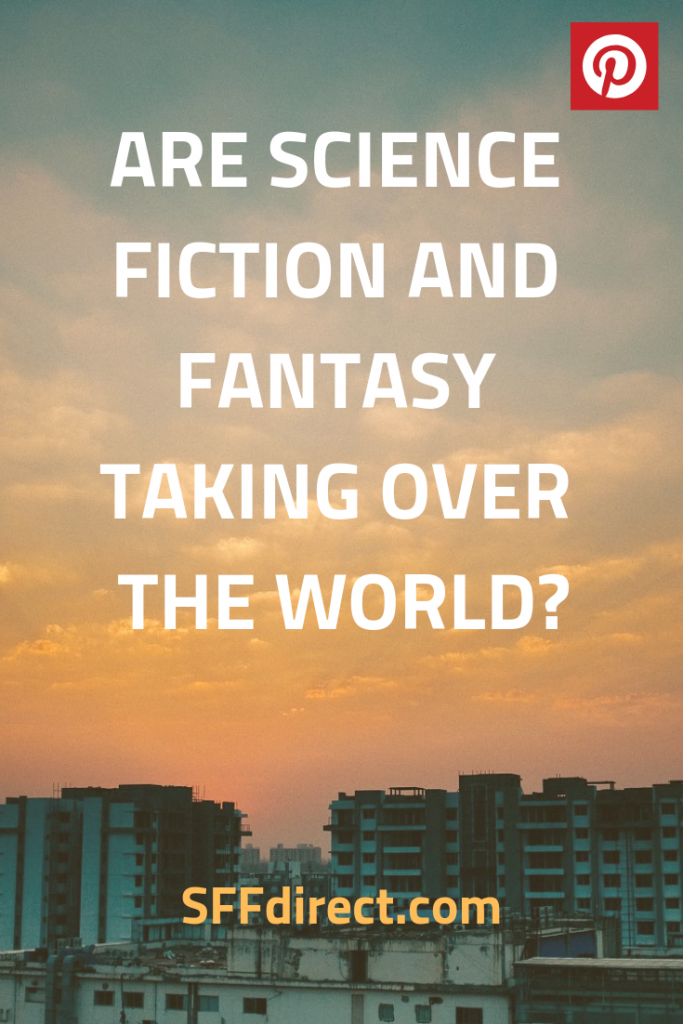Last week, I interviewed the successful science fiction writer, Ian Creasey, on behalf of SFFdirect (read the interview here). I asked Ian how he saw the future of science fiction and he replied that it is “conquering the world”. I’m inclined to agree. From then on, I’ve been pondering the question, and widening the scope to include fantasy as well as SF. This article gives my view.
Unpicking the answer
I actually think are are a few things going on at the moment. But broadly I can organise my answer by first talking about things to do with science fiction only, then about things to do with both science fiction and fantasy. Let’s start with the former.
The rise of Science fiction
If we’re considering whether science fiction is taking over the world, it is logical to ask when science fiction began. From what starting point did it grow into the force it is today?
The answer is far from straightforward. I recognise that stories about travelling to the moon and other planets have existed for nearly two thousand years. However, I’m going to stick my neck out and say that the first science fiction novel was Frankenstein (1818) by Mary Shelley.
This means that science fiction emerged toward the tail-end of the Industrial Revolution, as science and technology was becoming a major thing. Over time, science and technology has become increasingly intertwined with people’s lives. The gap between what is thought possible and what is thought impossible (thus pure make-believe in writers’ imaginations) has decreased. Accordingly, the ideas, tech and societies shown in SF books and films are less likely to be dismissed as being implausible.
Science fiction takes a central place
Because technology is so much a part of our lives now, and because humanity has already achieved a lot, it’s easy and inevitable for people to imagine the next step in books or films and to write stories based on science and technology. For example, humanity has already put a man on the moon, so why not imagine a colony on Mars?
Dystopian fiction (which is SF in my opinion) is also huge currently. This is because of issues such as climate change and political upheaval in many parts of the world. Thus SF is becoming mainstream.
Science fiction by osmosis
As SF is taken more seriously and becomes more widespread, people who would have been embarrassed to read an SF novel no longer feel that way. And writers are no longer put off writing it. SF writing is no longer a niche activity. Many authors of literary fiction in fact write science fiction but their book is displayed in the literary fiction section in bookshops. It is seen as literary fiction not SF. This may be because:
- The author is not seen as an ‘SF writer’, perhaps because they have written other books which are not SF.
- The standard of writing and tone of the book give it a literary quality.
- The book has won, or been short/long-listed for literary fiction prizes such as the Man Booker Prize.
Consequently, there are a lot of people nowadays reading science fiction without realising it is fact science fiction. In fact, one friend recently told me that if she’d realised the book she was reading was science fiction she wouldn’t have read it. She’d bought it because it won a prize for literary fiction and had great reviews. She enjoyed it very much.
The rise of Fantasy
If it’s hard to pin down the beginning of science fiction, it’s even harder to determine when fantasy first appeared. Human beings have always told stories and many of our oldest myths and legends are undeniably fantasy.
Notwithstanding the above, one of the founding fathers of modern fantasy is surely JRR Tolkien. His great works, The Hobbit (1937) and The Lord of the Rings (1949), came to widespread attention when people were recovering from two World Wars, and gave escapism.
[Everything I talk about from here on down applies to both Science Fiction and Fantasy.]
“Combined print and digital book sales in the genres of science fiction and fantasy have doubled since 2010, according to data from the publishing industry analysis blog Author Earnings.”
Forbes (click here to read the article)
Escapism through Science fiction and Fantasy
The yearning for escapism persists today. In modern times, people are extremely busy, and many work uninspiring jobs, living in cities far from nature and beautiful scenery. It is no wonder that they seek a release from their humdrum existence.
Many fantasy stories are tales of adventure, and they open up a whole new world so they fit the bill completely. Science fiction also can be hugely escapist.
In addition, there is a trope common in SF+F of ‘The Chosen One’, where a young person discovers they are destined for great things. This is hugely appealing for young people, who often feel like they don’t fit in. This can instill a love for the genre at an early age.
Presenting Science Fiction and Fantasy
Above, I talked about how the science fiction came into prominence by following the rise of technology. Now I’ll talk about a related issue: How our ability to tell SF+F stories has improved due to advances in technology.
Tales of SF+F often play out on vast stages, covering continents made up of many different locations. They often contain a stunning array of characters, including elves, dwarves, orcs, aliens and many more possibilities. In books there is no limit on this, but with films and television it is a different matter. Only relatively recently did films and television become able to employ the technology to create awe-inspiring special effects; reproduce exotic locations; and create convincing other-worldly characters through CGI.
Now that they are able to do so, the vast majority of box-office hits are science fiction or fantasy. So too are the television shows everyone raves about, for example The Walking Dead, Game of Thrones, Stranger Things and Russian Doll.
Diversity
We live in an increasingly diverse world and people are exposed to new ideas and beliefs all the time. People are more tolerant than ever. This makes people more open to explore new ideas and read about different races and species. Thus the SF+F genre is flourishing because people are more likely to try it and are more receptive to the ideas.
Also, it is no coincidence that the SF+F genre is flourishing now when there is a real drive towards an increase in diversity within the genre itself. This includes diversity in writers, for example encouraging writers of all nationalities, writers of colour, women writers, LGBTQ writers, and people with disabilities.
It also includes diversity in the characters that people write about and including the groups listed above. There is a real desire for change. Practical action is being taken, and it is leading to more stories, better stories and an explosion of talent within the genre.
So is SF+F taking over the world? Please tell me your thoughts in the comments below.


